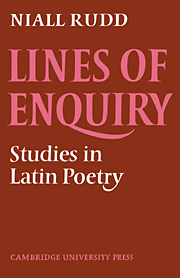Book contents
- Frontmatter
- Contents
- Preface
- Abbreviations
- 1 HISTORY: Ovid and the Augustan myth
- 2 IDEA: Dido's culpa
- 3 IMITATION: association of ideas in Persius
- 4 TONE: poets and patrons in Juvenal's seventh satire
- 5 ARCHITECTURE: theories about Virgil's Eclogues
- 6 THEORY: sincerity and mask
- 7 TRANSLATION
- Index of writers, scholars and translators
6 - THEORY: sincerity and mask
Published online by Cambridge University Press: 07 January 2010
- Frontmatter
- Contents
- Preface
- Abbreviations
- 1 HISTORY: Ovid and the Augustan myth
- 2 IDEA: Dido's culpa
- 3 IMITATION: association of ideas in Persius
- 4 TONE: poets and patrons in Juvenal's seventh satire
- 5 ARCHITECTURE: theories about Virgil's Eclogues
- 6 THEORY: sincerity and mask
- 7 TRANSLATION
- Index of writers, scholars and translators
Summary
A few years ago the distinguished American critic Lionel Trilling published a series of lectures entitled Sincerity and Authenticity. At the beginning he called attention to two responses which we are aware of when reading an ancient work of literature: ‘How like us those people were! How little human nature has changed!’ and at the same time ‘How different in their way of life, their thoughts, and their moral assumptions!’ So far so good. But after that Trilling went on to concentrate exclusively on the second response, proposing the idea that ‘at a certain point in its history the moral life of Europe added to itself a new element, the state or quality of self which we call sincerity’ (2). It then emerges that the crucial point in history was the late sixteenth and early seventeenth century and that the country where this momentous change took place was England.
Now when confronted with such a large and surprising statement we naturally assume that the writer is using his key terms in a deliberately strange or provocative way, and so we read on with our critical antennae on the alert. Trilling tells us that ‘sincerity’ as he understands it is restricted to certain phases of culture.
‘For example, we cannot say of the patriarch Abraham that he was a sincere man. That statement must seem only comical. The sincerity of Achilles or Beowulf cannot be discussed: they neither have nor lack sincerity. But if we ask whether young Werther is really as sincere as he intends to be, or which of the two Dashwood sisters, Elinor or Marianne, is thought by Jane Austen to be the more truly sincere, we can confidently expect a serious response …’
- Type
- Chapter
- Information
- Lines of EnquiryStudies in Latin Poetry, pp. 145 - 181Publisher: Cambridge University PressPrint publication year: 1976
- 1
- Cited by



